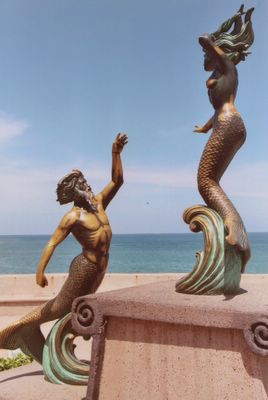The latest report I read concerning Terri Schiavo's condition is that her life is slowly drawing to a close. One's thoughts and prayers naturally go out to her and her family.
As I was thinking about this sad situation yesterday, I noticed that there seems to be one strain in Catholic tradition concerning end-of-life issues and bioethics which I have not heard mentioned a great deal in the media or in blogosphere. Yet it is important to be reminded of it.
It is simply this: Catholic tradition with respect to end-of-life issues and terminal illness has never been "vitalist," which is the belief that earthly life is an absolute value and that it must be preserved by all means and whenever possible.
Rather, Catholic tradition has held that the greater value to be sought after is life eternal: that this ought to guide health care professionals, patients and their families, and ethicists. To unpack this point, there are three things/principles that need mentioning.
First, the Church upholds the sacredness of human life and that the sick and the dying in their condition possess the same dignity that everybody else has. Therefore, the Church teaches that the sick is to be given every treatment necessary for their well-being and restoration to good health. Their interests must guide their doctors.
Second, that the medical treatment given to a terminal patient should be "proportionate" to the patient's condition. This means that the treatment must offer some real benefit and that the patient and the patient's family are not burdened. If prolonging treatment causes hardship and burden (emotionally, mentally, physically, spiritually), then it is deemed "disproportionate" and the Church allows its discontinuation.
One way of looking at this is figuring if the treatment negatively affects a patient's quality of life. If it does, then continuing the treatment is considered "disproportionate." And another way of viewing this is figuring if the treatment is considered "basic" or "ordinary," given the patient's condition: if the treatment is aggressive or over-zealous, then it is "disproportionate." "Proportionate" is "ordinary" and "basic" medical treatment.
John Paul wrote on this only last year. But his message only deals specifically with artificial nutrition and hydration (ANH): that is, feeding tube and ventilator. His main point--now listen closely--is that these are not medical treatment, but rather medical care: these are not meant to "treat" or "cure" a patient in a "persistent vegetative state," but are meant to provide care. And because of that, ANH are morally obligatory. In other words, these are considered "proportionate" and "basic" care to a patient in PVS. In his
allocution, he wrote that "the administration of water and food, even when provided by artificial means, always represents a natural means of preserving life, not a medical act. Its use, furthermore, should be considered, in principle, ordinary and proportionate, and as such morally obligatory."
John Paul's words are partly the basis for the Florida's bishops' own
words calling for the continuation of Schiavo's use of artificial nutrition.
Third, that earthly life is indeed of sacred value, but that it is
secondary to the value of eternal life. In other words, life in this world is not of absolute value. Eternal life is. Indeed, our life here on earth is but a foretaste and a shadow of the life to come. Therefore, clinging to this earthly existence at all costs when all possible medical treatments have been exhausted and found wanting says quite a lot about that patient's lack of spiritual readiness and preparation.
Now, applying this third principle to Schiavo's case, does it mean that the feeding tube should not be reinstated? No it does not, because, as the Florida bishops and the Pope himself have said, ANH constitute obligatory medical care.
But these third and second principles do have something to say to the many people out there who are watching the Schiavo case and who are probably aghast at the thought that one day they may have to go through a prolonged death as they are being kept alive artificially. The Church allows her members to refuse aggressive medical treatment if it is "disproportionate" and if it prevents them from attaining the greater spiritual value of peacefully passing from this world and onto the next life. This is what it means to say that "the Church's ethical position is not vitalist."
Now, Pope Pius XII nicely integrates all three principles in his
Allocution from 1957: "Normally one is held to use only ordinary means--according to circumstances of persons, places, times, and culture--that is to say, means that do not involve any great burden for oneself or another....Life, health, all temporal activities are, in fact,
subordinated [emphasis mine] to spiritual ends."
Supporting Pius' words, the
Declaration on Euthanasia from the Congregation of the Doctrine of the Faith in 1980 says that "Everyone has the duty to lead his or her life in accordance with God's plan. That life is entrusted to the individual as a good that must bear fruit already here on earth, but that finds its full perfection only in eternal life."
So, from all of that, there are three things which I would like to reiterate: First, that earthly life is indeed sacred, but not absolute; it is relative to eternal life. Secondly, that ANH are obligatory and are considered basic medical care, not treatment. This is the reason why the Church has said that Schiavo's feeding tube ought to remain;
it is not because the Church wants everyone to be kept alive no matter what. Thirdly, that it is moral to refuse further medical treatment when one is reasonably convinced that life is coming to an end, and that a prolongation of dying is a burden.
This is not suicide, nor is this euthanasia. In suicide or euthanasia, although there may be an irreversible disease or medical condition, death is caused by an inflicted lethal act. However, in refusing some sort of aggressive medical treatment, one that is "disproportionate" or "extraordinary", a person is accepting what is inevitable. There is a great deal of difference between suicide/euthanasia and allowing oneself/a patient to die. The former constitutes killing, but the latter recognizes the greater value of eternal life when one's earthly life is irreversibly coming to an end.
In support of this, the Catechism says that "Discontinuing medical procedures that are burdensome, dangerous, extraordinary, or disproportionate to the expected outcome can be legitimate; it is the refusal of 'over-zealous' treatment. Here one does not will to cause death; one's inability to impede it is merely accepted. The decisions should be made by the patient if he is competent and able or, if not, by those legally entitled to act for the patient, whose reasonable will and legitimate interests must always be respected" (article
#2278).
The many folks who have called for the restoration of Schiavo's feeding tube have said that its removal is yet another symptom of our society's prevailing culture of death and of the diminishment of human dignity. They have a point. However, I would caution them when they make such statements, because one can also argue the flip-side of this:
Medical technology has advanced to such an extent that we can all be kept "alive" artificially, pushing back the inevitable advent of death. The result of this infringement (or even arrogance) of medical technology with regards to the natural rhythm of life and death is a diminishment of patients' quality of life, robbing patients of their dignity. The term "vegetative state," as horrid as it sounds, is not a term that was coined by accident. Patients have been rendered like "vegetables" because of the "advancement" and the over-zealous intrusion of technology. This is no way to live. And this is why the Church has an ethical tradition which is not "vitalist."








